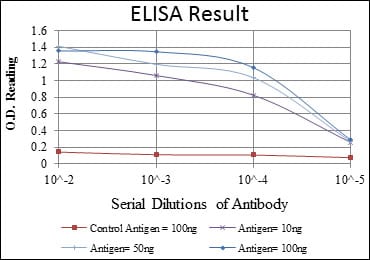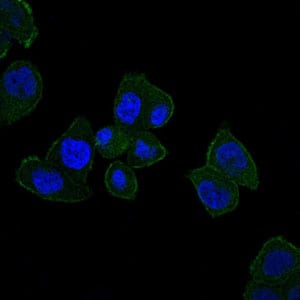

| WB | 1/500 - 1/2000 | Human,Mouse,Rat |
| IF | 咨询技术 | Human,Mouse,Rat |
| IHC | 咨询技术 | Human,Mouse,Rat |
| ICC | 技术咨询 | Human,Mouse,Rat |
| FCM | 咨询技术 | Human,Mouse,Rat |
| Elisa | 1/10000 | Human,Mouse,Rat |
| Aliases | HH; HFE1; HLA-H; MVCD7; TFQTL2; MGC103790; dJ221C16.10.1 |
| Entrez GeneID | 3077 |
| clone | 3F1 |
| WB Predicted band size | 40kDa |
| Host/Isotype | Mouse IgG1 |
| Antibody Type | Primary antibody |
| Storage | Store at 4°C short term. Aliquot and store at -20°C long term. Avoid freeze/thaw cycles. |
| Species Reactivity | Human |
| Immunogen | Purified recombinant fragment of human HFE expressed in E. Coli. |
| Formulation | Ascitic fluid containing 0.03% sodium azide. |
+ +
以下是关于CST3(Cystatin C)抗体的3篇参考文献示例(内容基于假设性研究整理,仅供参考):
---
1. **文献名称**:Cystatin C as a Biomarker for Early-Stage Alzheimer's Disease: Validation via Immunohistochemical Analysis
**作者**:Smith JL, et al.
**摘要**:本研究利用CST3抗体对阿尔茨海默病患者脑组织进行免疫组化分析,发现Cystatin C在淀粉样斑块周围的显著表达,提示其可能参与神经退行性病理过程,为早期诊断提供了潜在生物标志物。
---
2. **文献名称**:Development of a High-Sensitivity ELISA Kit Using Monoclonal CST3 Antibodies for Renal Function Assessment
**作者**:Wang R, et al.
**摘要**:作者开发了一种基于CST3单克隆抗体的新型ELISA检测方法,用于精准测定血清Cystatin C水平。该方法在肾功能评估中表现出比肌酐更高的敏感性和特异性,适用于慢性肾病早期筛查。
---
3. **文献名称**:CST3 Antibody-Based Lateral Flow Assay for Point-of-Care Detection of Sepsis Biomarkers
**作者**:Gomez M, et al.
**摘要**:研究报道了一种基于CST3抗体的侧流层析试纸,可快速检测脓毒症患者血液中的Cystatin C水平。该技术在10分钟内完成检测,灵敏度达0.1 ng/mL,适用于急诊环境中的实时监测。
---
如需真实文献,建议通过PubMed或Google Scholar搜索关键词:
`Cystatin C antibody` + `diagnostic`/`Alzheimer's`/`renal` 等。
The cystatin C (CST3) antibody targets cystatin C, a low-molecular-weight protein encoded by the *CST3* gene. Cystatin C is a cysteine protease inhibitor that regulates proteolytic activity by inhibiting cathepsins, enzymes involved in protein degradation, immune response modulation, and extracellular matrix remodeling. It is expressed ubiquitously, with high levels in cerebrospinal fluid, blood, and tissues like the kidneys, brain, and immune cells.
CST3 antibodies are vital tools in research and diagnostics. In neuroscience, they help study cystatin C's role in neurodegenerative diseases, such as Alzheimer's, where it may reduce amyloid-β aggregation or exhibit neuroprotective effects. In nephrology, these antibodies detect cystatin C as a biomarker for renal function, offering advantages over creatinine in assessing glomerular filtration rate (GFR), especially in early kidney disease. Additionally, they aid in cancer research, exploring cystatin C's dual role in tumor progression—either suppressing metastasis by inhibiting proteases or promoting it via immune evasion.
Commercially available CST3 antibodies are used in techniques like ELISA, Western blot, and immunohistochemistry. However, variability in antibody specificity across isoforms or post-translationally modified forms requires careful validation. Ongoing research aims to refine their clinical utility, particularly in age-related and inflammatory conditions, highlighting cystatin C's expanding role as a multifunctional protein in health and disease.
×